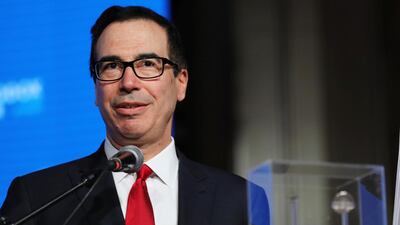The United States Treasury on Tuesday imposed sanctions against the governor of Iran’s Central Bank, an Iraq based financial institution and its chairman, accusing the men of handling millions of dollars of transactions for Iran’s Revolutionary Guard and Lebanon’s Hezbollah.
“Iran’s Central Bank Governor covertly funnelled millions of dollars on behalf of the IRGC-[Qods Force] through Iraq-based al-Bilad Islamic Bank to enrich and support the violent and radical agenda of Hezbollah,” Treasury Secretary Steven Mnuchin said in a statement. “It is appalling, but not surprising, that Iran’s senior-most banking official would conspire with the IRGC-QF to facilitate funding of terror groups like Hezbollah, and it undermines any credibility he could claim in protecting the integrity of the institution as a central bank governor.”
The announcement named Valiollah Seif, the governor of the Iranian Central Bank, as well as Ali Tarzali, the assistant director of the International Department at the Central Bank of Iran, and accused the pair of “assisting, sponsoring, or providing financial, material, or technological support for, or financial or other services” for the Revolutionary guard and Hezbollah. However, the sanctions did not extend to the Central Bank as a whole.
The announcement also includes Aras Habib, the Chairman and Chief Executive of Iraq based Al-Bilad Islamic Bank on similar charges. The statement reports that Habib facilitated payments from Iran to Hezbollah through the Iraqi banking system. The Al-Bilad Islamic Bank was also included in the sanctions.
Lastly, the Treasury imposed sanctions against an individual named as Muhammad Qasir for working to facilitate payments to Hezbollah although the statement did not indicate the role that Mr Qasir had played in the reported money transfers.
The sanctions against the high-level Iranian official are the first since US President Donald Trump announced his withdrawal from the 2015 nuclear deal, however the new administration has both drafted and passed several new sanctions bills as part of a more aggressive stance towards Hezbollah.
In October 2017, the US announced the first financial reward in over a decade for information leading to the capture of two senior Hezbollah commanders. US State Department Counter-Terrorism Coordinator Ambassador Nathan Sales announced that the American Rewards for Justice program was offering up to $7 million for any information on the location, arrest or conviction in any country on Talal Hamiyah and up to $5 million for such information on Fuad Shukr.
Sales said at the time that Shukr was a close military adviser to party Secretary-General Sayyed Hasan Nasrallah and also the commander of Hezbollah forces in south Lebanon. He said that Hamiyah heads Hezbollah’s External Security Organization that deals with the group’s activities outside of Lebanon.
Hezbollah has rapidly expanded its regional footprint in recent years, heavily backing the embattled Syrian President Bashar Al Assad and carrying out extensive operations in Iraq. They are also reported to operate across the region, including in Yemen and Bahrain.

